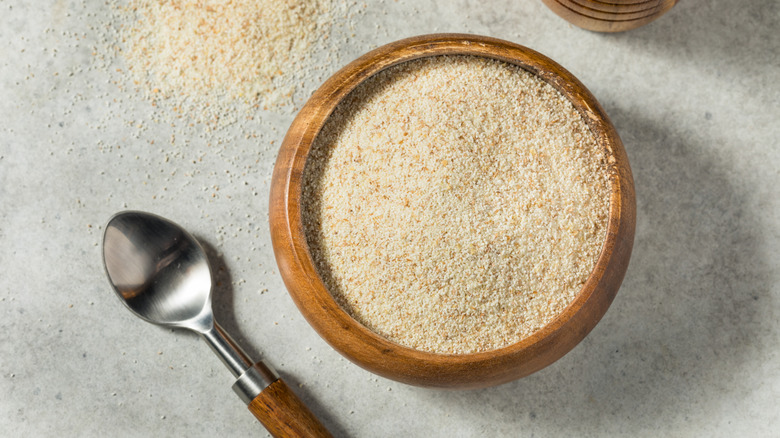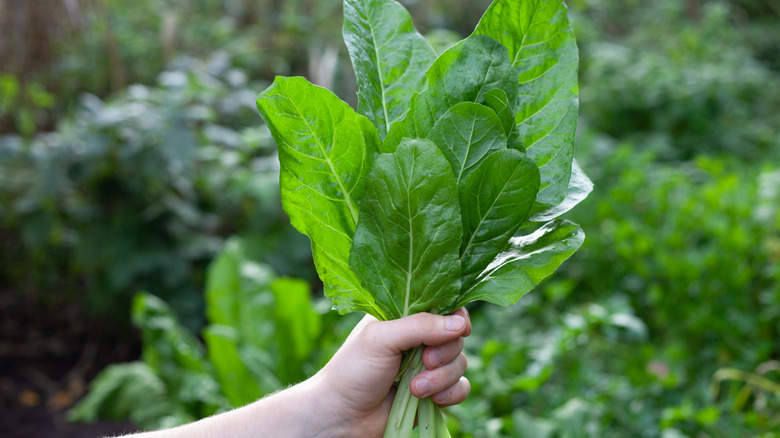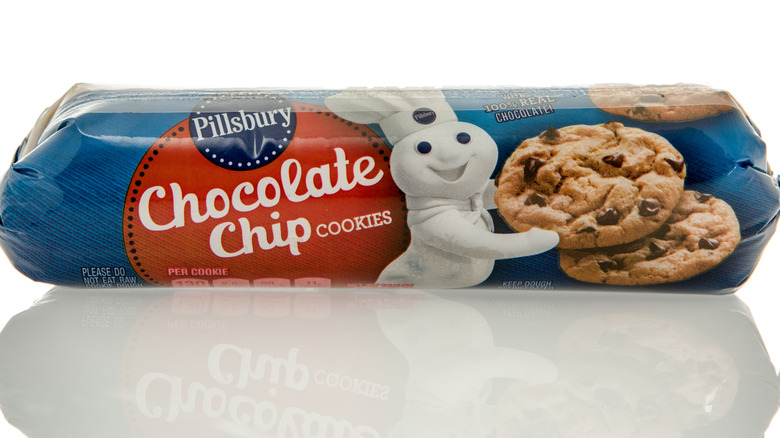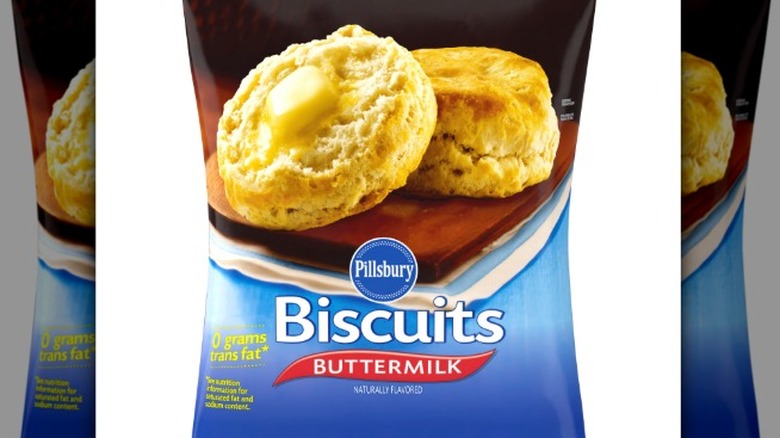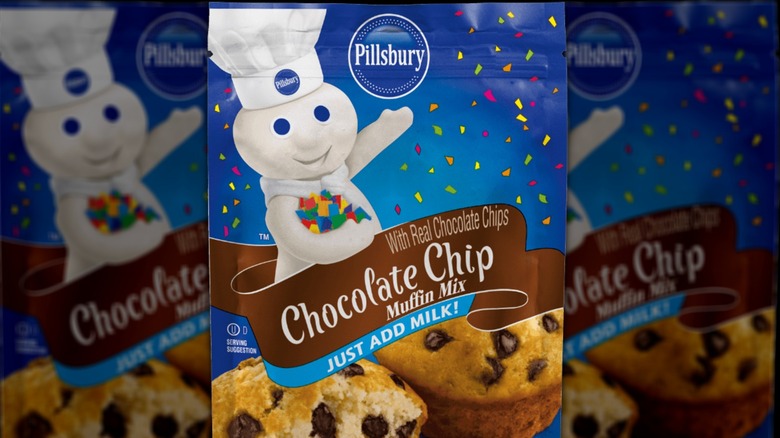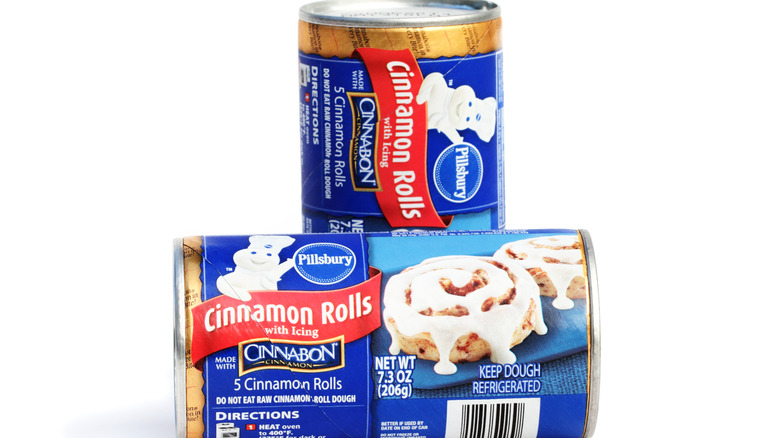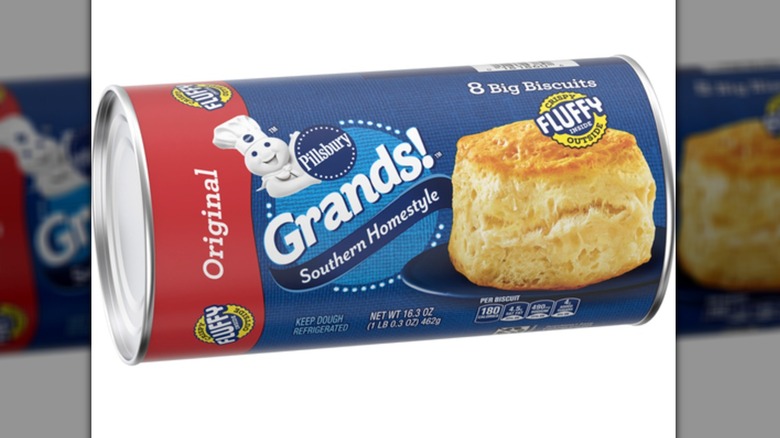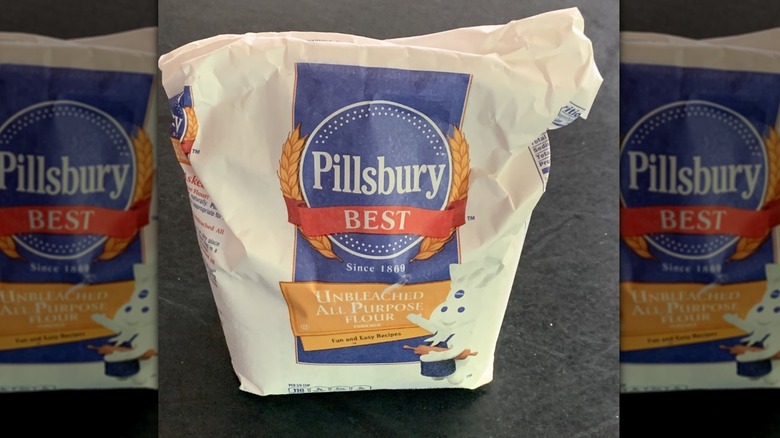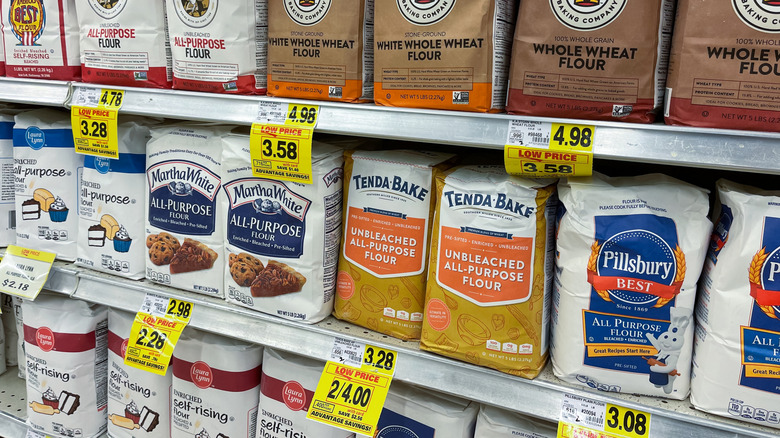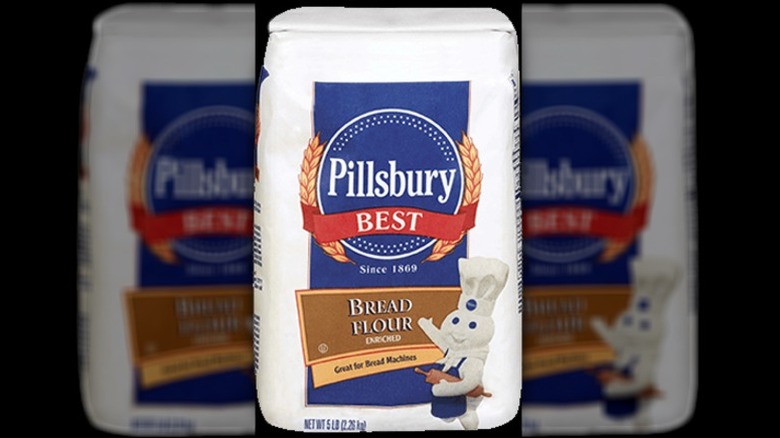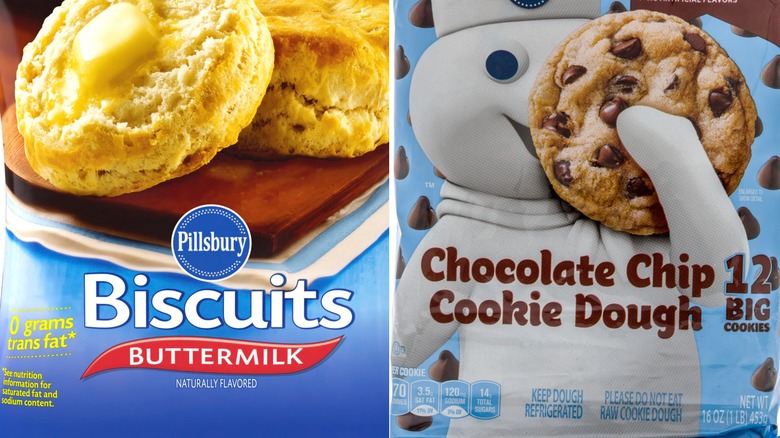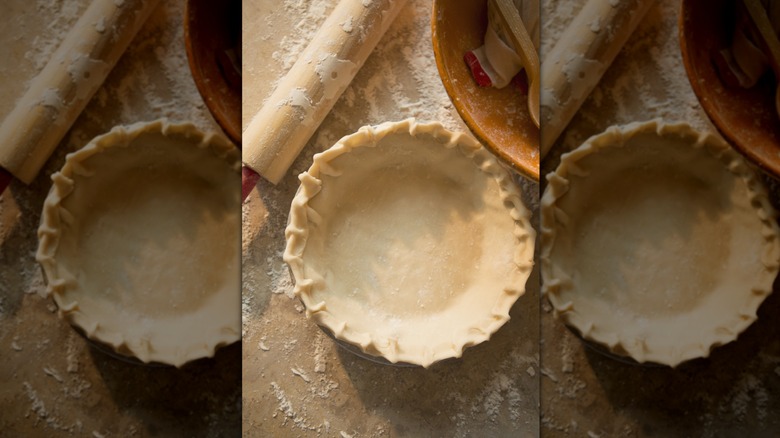Pillsbury Recalls That Affected Millions
Anyone who's walked through a grocery store or turned on cable T.V. almost certainly knows about Pillsbury. With humble Minnesota beginnings, it has since evolved several times and gained worldwide notoriety. The company only sold flour at first, and while it still does, that product is now just a small portion of its stock. Founded by Charles Alfred Pillsbury in 1869, the brand has since become a masterclass in innovation and growth, developing a slew of products made to make baking simple. And with delicious recipes, a popular yearly Bake-Off, and a thriving online presence, Pillsbury continues to catapult itself to American cultural ubiquity — but that's not all it's known for.
Even the most successful businesses go through hard times; and over the years, there have been more than a few dark days for the Pillsbury Doughboy, as the company struggled to keep many of its products on shelves. The recall process, coming to fruition after the passing of the 1906 Pure Food and Drug Act, was meant to protect consumers from ingesting contaminants or allergens. Removals can either be done voluntarily by distributors or imposed by one of two government agencies. The U.S. Department of Agriculture, or the USDA, is responsible for overseeing all meat, poultry, and eggs products, while the U.S. Food and Drug Administration, widely known as the FDA, regulates all other consumable products, from prescription drugs to common lunchbox snacks. Though food recalls have recently been making headlines more frequently, Pillsbury has been dealing with them for decades.
Farina cereal (1971)
Pillsbury's first brush with the Food and Drug Administration was almost a century after the company's inception and over 50 years after the first ever reported recall. After shards of glass made their way into Farina cereal at the Pillsbury's Minneapolis plant, the company requested a one-code removal of its 27.5 ounce packages in four Western Massachusetts counties and seven in Connecticut.
Just a few years prior, the brand was flying high. In collaboration with NASA, Pillsbury launched two groundbreaking projects with space explorers in mind: Space Food Sticks, the first solid food to be eaten in space, and the Hazard Analysis Critical Control Point (HACCP) — a set of standards providing food regulation guidance for astronauts and earthlings alike. In an effort to reduce widespread illness and harm, the system ultimately sought to prevent food contamination during production, and still does. It may seem ironic that Pillsbury had to pull one of its most iconic products so soon after releasing an industry-changing safety campaign, but accidents happen — even when following protocol. By taking immediate action, the brand sent a message aligned with the HACCP's purpose. To Pillsbury, food safety would always come first, whether that meant creating an impact with new standards or taking ownership of its mistakes (it would have to do the latter quite a bit). Though this was the first recall, it certainly wouldn't be their last.
Cut-leaf spinach (1995)
What does spinach have to do with biscuits? Besides being two common side dishes on a dinner plate, both products were at one time under the same conglomerate: Pillsbury. This may come as a shock as the industry giant is known for its baked goods, but before the brand was acquired by General Mills in 2001, Pillsbury had quite the impressive portfolio, owning industry leaders like Haagen-Daz, Burger King, and Green Giant.
In the words of author Terry Pratchett, "even if it's not your fault, it's still your responsibility." The thing about owning multiple companies is that when something goes awry on the production line, it's up to the big boss to fix it. So when a customer found fly larvae inside a box of greens in June 1995, it was Pillsbury that responded. The same day the FDA tested and confirmed the presence of larvae and rodent contaminants, the brand voluntarily recalled four frozen spinach products, including Green Giant Cut-Leaf Spinach and 16-ounce bags of Green Giant Pasta Accents Florentine. The root of the problem was narrowed down an undisclosed packaging site, but the products had already been widely distributed. To be safe, Pillsbury pulled a wider range of codes from grocery store shelves a few days later.
Cookie dough (1998)
Peanuts and tree nuts have gotten a major PR makeover over the past decade — and rightfully so. Full of brain boosting omega-3s and crunch, there is no questioning their benefits both in taste and health. But let us not forget the danger they present to those with allergies. Don't get us wrong, there have been major advancements in allergy protection. But for some, even airborne exposure requires immediate medical attention.
On September 8 1998, Pillsbury voluntarily recalled over 8,000 cases of 18-ounce packages of refrigerated chocolate chip cookie dough for failing to include walnuts on the ingredient list. The recalled lot spanned several states including Illinois, Indiana, Iowa, and Wisconsin, and targeted packages with "For Best Results Use Before Nov. 18 J" and "For Best Results Use Before Nov 18 K." The mislabeled products were replaced with proper packaging soon after.
Marketing accidents happen; art might go out blurred or perhaps the occasional word is left out of a company slogan. No doubt, these mistakes are never a good look, but the fallout usually comes in the form of dollars and cents. When the product is food, however, there is little (if any) room for error. In this case, the consequences could have been grave, resulting in serious harm, or worse, death. Thankfully, there were no reported reactions to the cookie dough.
Frozen biscuits (2001)
This product retraction didn't involve glass or cereal. Still, it's hard to ignore the similarity between Pillsbury's first recall, which took place exactly 30 years prior, and the decision to voluntarily remove 30,000 cases of frozen biscuits from shelves in July 2001. Both incidents involved contamination of a foreign object, but this time with a more modern spin — plastic.
At the time, the chief complaint was the shards becoming a potential choking hazard. And that would have been a more than likely outcome; but now, over 20 years later, we know there was a more insidious cause for concern. According to a 2023 study published in the Yonsei Medical Journal, "Sharp microplastic particles can cause toxicity by physically stimulating the body." Although more research needs to be done, the same study states that plastic consumption can also cause inflammation and compromise hormone release. Had the mishap taken place more recently, it might have been cited as another cause for the biscuits' removal, but only due to the size of the shards. The recall was eventually rectified; but only for a time. In coming years, Pillsbury would pull more biscuit codes, and find more shards of plastic in its food.
Chocolate chip muffin mix (2002)
Even the least discriminating sweet tooth likely falls into one of two camps: team milk chocolate or dark chocolate. For some folks, however, it's not a matter of taste preference, but well-being. In September 2002, International Multifoods Corp. nixed 753 cases of Pillsbury Chocolate Chip Muffin Mix in Illinois, Iowa, Maine, Massachusetts, Michigan, Minnesota, Nebraska, New York, North Dakota, South Dakota, Vermont, and Wisconsin.
Just four years after its last advertisement-based blunder, the voluntary recall was reported to the FDA after discovering a number of packages containing milk chocolate chips did not disclose the allergen on their labels. This came as a surprise, since Pillsbury generally uses dairy-free semi-sweet chocolate in its products.
Unknowingly biting into a milk chocolate chip muffin could cause major discomfort to people who suffer from lactose intolerance, but dairy allergies often go beyond stomach pain; some are so severe they trigger anaphylactic shock, a reaction that can result in death unless you take swift action. Thankfully, there were no reported illnesses or fatalities related to the muffin mix.
Cinnamon rolls (2013)
Everyone loves that crunchy crystalized baker's sugar we see on top of scones, muffins, and cinnamon rolls — but not when those crystals are in fact something else. After a broken piece of plastic from the plant made its way into one of Pillsbury's most iconic items, the brand recalled two varieties of Pillsbury's Cinnamon Rolls with Icing: eight-count single packs and two-count packs spanning multiple October 2013 "best by" dates.
Always a step ahead, Pillsbury took the opportunity to appeal directly to consumers in a Facebook post, providing code numbers, answering customer questions, and suggesting other Pillsbury alternatives. The comment section was certainly mixed. Some commentators understandably conveyed concern, while other folks made a case for ditching the packaged food altogether to make at-home treats from scratch. But at-home pastry making can be intimidating and time-consuming. Pillsbury customers tend to go for easy-to-make, delicious treats that work every time. It was clear that long-time fans appreciated the information, honesty, and engagement, and didn't plan on abandoning the brand anytime soon. "Just called as I had some of these. They were very courteous. Even though I have to throw my rolls away, I will most definitely keep buying them" wrote one user. They weren't alone in the sentiment.
Biscuit Dough (2014)
Pillsbury Biscuit Dough is the perfect pop and bake side dish. A tried and true solution for busy bees invited to potlucks, dinner parties, or just looking to satisfy a craving, it has surely scored a regular spot in refrigerators all over the map. And with such a captive audience, it's important that what's on the can matches what's inside of it.
On September 26th, 2014, Pillsbury yet again made a voluntary recall for its Refrigerated Biscuit Flaky Layers and Refrigerated Buttermilk Biscuit packs of four. The order of operations at the plant went awry, leaving the product's inner packaging with the correct label and the outer wrap advertising one of its other products. This is the third time a mislabeling recall had to be made and the second time Pillsbury mixed up packaging including a potential dairy allergen. There were no reported illnesses associated with the removal, but the incident impacted 720 cases of biscuits, leaving them out of commission for the time being. Unfortunately, the biscuits were unavailable for the holiday season but made a comeback in time for the new year.
Unbleached all-purpose flour (2019)
These days, Pillsbury is best known for a delicious end result — biscuits, crescents, cookies, and cinnamon rolls. But before those at-home favorites hit grocery store shelves, Pillsbury was a flour mill. Even now, Pillsbury uses its own stock in all ready-to-make products. So when Unbleached All-Purpose Flour was recalled for possible salmonella contamination over a century after its inception, the brand's standing grew shaky to say the least.
When salmonella makes the news, it's typically due to contamination in raw meat, eggs, fruits, and vegetables. According to the World Health Organization, the bacteria most often comes from animal products. Because flour doesn't fall into any of those categories, the contamination feels particularly eerie. Due to its versatility, it's a cooking cornerstone. It's hard to imagine everyday kitchen actions like breading and baking suddenly becoming risky.
The recall specifically affected 5-pound bags with April 19 2020 and April 20 2020 "best by" dates. This was largely done as a cautionary measure, as the stuff is hard to trace. And while there were no reports of flour-related illness yet, this was only the beginning of a year of filled with public health woes.
All purpose flour (2019)
Things started to settle for Pillsbury after the March 2019 salmonella recall — until the brand got slammed with a possible E. Coli outbreak only two months later. But this time, it wasn't the only one. Once owning the largest flour mill on the planet, Pillsbury eventually moved locations in 2001 after the General Mills merger. Its new home, ADM Milling Co., services multiple brands like King Arthur Flour, Brand Castle Mixes, and more.
On May 23 2019, ALDI and ADM Milling Co. made a joint recall of ALDI's Baker's Corner All Purpose Flour 5-pound bags after testing positive for E. Coli O26 bacteria. With 18 illnesses and three hospitalizations across nine states linked to the ADM-derived flour, concerns for cross-contamination naturally swept through the mill. It was only a matter of time before its other patrons, including Pillsbury, would issue a similar recall. The discovery halted much of the wholesale flour industry, as ADM is one of its biggest purveyors. Though ADM went to great lengths to investigate the incident, no one knows where the E. Coli came from.
Best bread flour (2019)
Hometown Food Company, which serves as a parent to Pillsbury, decided it's better to be safe than sorry when it decided to issue a recall for Best Bread Flour in June 2019. The choice was made three months after the initial salmonella removal and two months after the multi-brand E. Coli recall forced Pillsbury All Purpose Flour out of stores. This created a trifecta of 2019 recalls. Since Best Bread Flour was processed at the same plant as All-Purpose Flour, no one wanted to take a chance. The delayed removal added 4,620 cases of 5-pound bags to a staggering 16 million pound mass flour contamination. In an official statement, the FDA announced the outbreak's ending in July 2019.
In the meantime, Pillsbury was working hard behind the scenes. That same month, the brand announced three new items on its website: Place and Bake Brownies, Sweet Biscuits with Icing, and Filled Crescents. The number of products and the release's timing conveniently coincides with the three recalled flour varieties and the outbreak's lift, perfectly positioning Pillsbury away from recalls and toward the future. Of the three new products, only the crescents still remain on Pillsbury's official stock list.
Biscuit and cookie dough (2019)
Recalls are often thought of as production line disasters or gross displays of company neglect. And while a staggering amount of food retractions can be traced to those factors, sometimes, they're simply a matter of bad luck. In 2019, this was the case for Pillsbury.
In mid-June, before the solstice and after the arrival of summer heat, a C&S Grocers Inc. truck lost power on the way to two New York Target locations. The truck was not filled with shelf stable snacks but refrigerated perishables. The result: a voluntary recall of everything on board including Pillsbury biscuit and cookie dough.
Because the malfunction affected multiple categories within the food realm, C&S had to work with both the FDA and USDA to account for everything. According to the official report, the stock's removal was due to "process deviation" and "temperature abuse." Other popular food purveyors like Lactaid and Kraft were also affected by the recall, but the news was particularly unwelcome with Pillsbury, as the brand just began to recover from an onslaught of major recalls that same year.
Pie crust (2021)
The most recent Pillsbury recall to date was not triggered by the brand or the FDA. In May 2021, the Defense Commissary Agency, responsible for providing groceries to military personnel, requested an immediate withdrawal of refrigerated pie crusts.
The agency did not cite any safety issues with the product but, instead, raised concern about the crust's perceived quality diminishment. Apparently, its flavor didn't fall in line with military standards. While something so subjective doesn't meet the general recall standard, Pillsbury obliged and voluntarily removed two code dates from shelves.
It is unclear whether Pillsbury's deference is partially due to its history serving government agencies like NASA, or a desire to show commitment to quality control despite a litany of past recalls. But the brand has since steered clear of them, allowing customers (government-funded or not) to take biscuits, pies, and crescents from the grocery store aisle to the dinner table.

